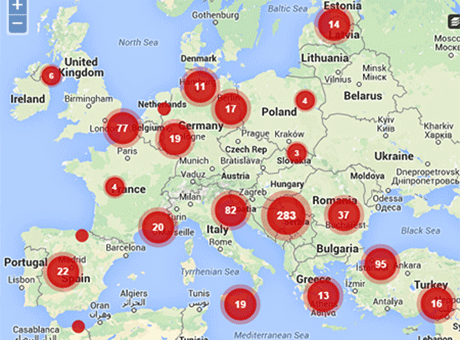28 Aug 2015 | Croatia, Mapping Media Freedom, mobile, News and features
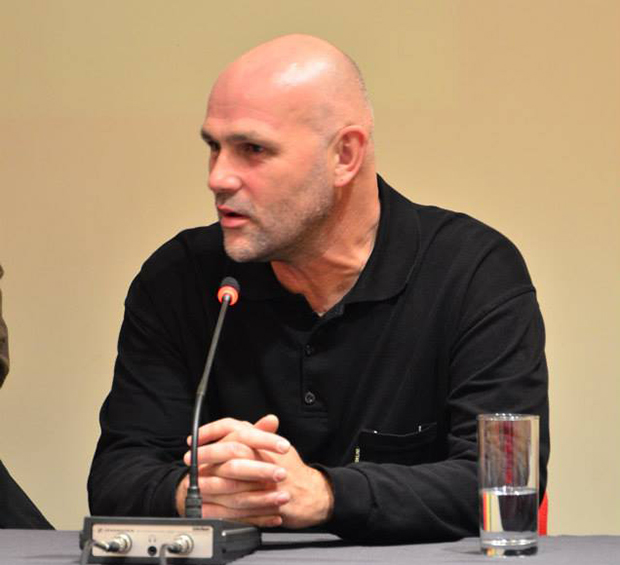
Sasa Lekovic at a Mediacentar Sarajevo event in 2013 (Photo: Mediacentar Sarajevo)
Over the past few months, death threats, physical assaults and intimidation have plagued the Croatian media. This drastic deterioration of media freedom is recorded through Index’s Mapping Media Freedom. In the first year of the campaign — from May 2014 — there were 24 verified incidents in Croatia. Between May and August 2015, there were 14, a 75% rise in verified reports over the same period last year.
This surge in media violations was recently addressed by the Croatian Journalists’ Association (CJA) and an OSCE representative on Freedom of the Media. In a statement published on its website, the CJA highlighted impunity as one of the main issues hindering media freedom throughout the country. “The CJA once again calls on authorities to find and adequately punish those who have threatened and attacked journalists, and to also find those who potentially ordered the attacks.”
The primary concern of the CJA is the long line of unresolved cases surrounding death threats and attacks on journalists. Exactly one year since freelance journalist Domagoj Margetic was brutally beaten in front of his apartment in Zagreb — an attack the Croatian State Prosecution has characterised as attempted murder — information on the attacker and the motive remain absent. Other unresolved cases include that of Antonio Mlikota, graphic editor at the Hrvatski Tjednik newsroom who was bound and threatened with a gun, and Hrvoje Simicevic, a journalist at H-Alter who was physically assaulted. There was also a series of death threats addressed to Katarina Maric Banje, a journalist for Slobodna Dalmancija, Drago Pilsel, editor-in-chief of the Autograf website, and Sasa Lekovic, the president of the CJA, along with others that have not been made public.
In light of the influx of violence, Index spoke to Lekovic, who also received a death threat. Lekovic assumes it was issued as a result of his new role, adding that the CJA makes people who want to control the media very nervous.
Discussing the most prominent threats to media freedom, he emphasised that “journalists in Croatia are under mixed pressure from politicians, media owners, mighty tycoons and organised crime.” Lekovic says this is not particularly new, adding that for almost two decades journalists have been subjected to such threats. “Generally speaking, it isn’t easy to discern the small distinction between these actors, if any.”
Although the primary threat to media freedom is self-censorship, the lack of media integrity is also a problem. “On one hand, we have a number of media outlets, especially web portals, not following any professional standard; they are actually using media freedom against the media,” Lekovic told Index. “On the other hand, we also have some laws that are used against professionals to suspend their right to serve public interest.”
In recent years, the CJA has taken multiple steps towards fostering a more relaxed and professional environment for media workers. Among other measures, they started a project called The Center for Protection of Public Speech.
“We have lawyers who are helping journalists that are in danger, including providing pro bono support and court representation. On the other hand, the CJA is going to work on ideas that better media legislation and their implementation and ones that will improve media literacy and training,” Lekovic says. “It’s all connected and is a long-term job that will not be completed overnight.”
On deteriorating media freedom, Lekovic says the current climate is notably worse than it was two years ago. He explains that “when Croatia was applying to become an EU member, it was under pressure to fulfill EU legislative requirements within the media sphere, but once the country joined the EU, nobody cared about upholding them”.
The OSCE Representative on Freedom of the Media, Dunja Mijatovic, has called on Croatian authorities to protect critical voices and to investigate the increase in attacks on journalists. Mijatovic wrote to Croatia’s Foreign Minister, Vesna Pusic, calling for swift and transparent investigations.
“As far as I am aware, all these cases remain unresolved,” Mijatovic wrote. “Condemnation coming from the highest level of government should be a clear sign that these acts of intimidation and violence against journalists will not be tolerated.”
Lekovic added that Croatia’s upcoming parliamentary election due by February 2016 is adding to the pressure.
Mapping Media Freedom
Click on the bubbles to view reports or double-click to zoom in on specific regions. The full site can be accessed at https://mappingmediafreedom.org/
|
Related:
• Croatia: 35 reports since May 2014
This article was published at indexoncensorship.org on 28/8/2015
27 Aug 2015 | Europe and Central Asia, mobile, News and features
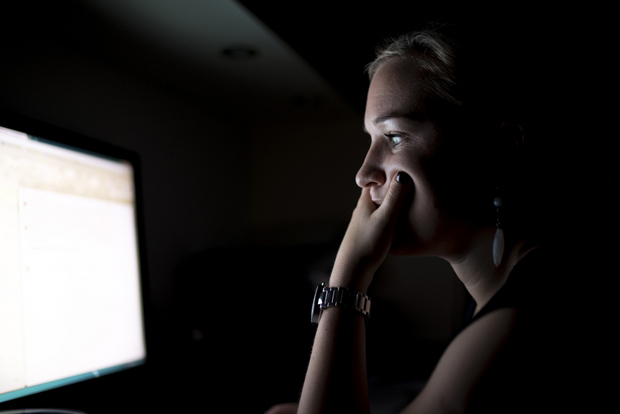
Female journalists and bloggers are increasingly being singled out and fiercely attacked online. (Photo: OSCE)
In a new online column for Index on Censorship, Dunja Mijatović, OSCE Representative on Freedom of the Media, discusses relentless attacks on women journalists, and the impact on their lives.
No job comes without sacrifices, but how many downgrading comments, criticism or even threats can one person take before it becomes too much?
Just consider the experiences of a female journalist that I know:
She had her phone number shared on dating websites, her email and other accounts were hacked, she received death threats on Skype, the website publishing her articles was hacked and a sex video was posted with the implication that she had participated in an orgy. Anonymous articles with lies about her and her family were also posted online.
Imagine being forced to shut down your accounts on social media platforms because of such massive attacks with detailed images of rape and other forms of sexual violence.
At one point, you would probably be inclined to ask yourself if it is really worth it. Is this a career I want to continue to pursue?
In the past few years, more and more female journalists and bloggers have been forced to question their profession. Male journalists are also subject to hate speech and online abuse, but research findings suggest that female journalists face a disproportionate amount of gender-based threats and harassment on the internet. They are experiencing what Irina Bokova, director-general of UNESCO, has described as a “double attack”: they are being targeted for being both a journalist and a woman.
How do these attacks affect female journalists’ lives, their work and society in general? Journalists are used to being in the frontline of conflict and they often deal with difficult and even dangerous situations. But what if you cannot shield yourself from these threats? What if the frontline became your own doorstep, your office or your computer screen?
Not only do these kinds of attacks cause severe physiological trauma for journalists and their families, but by constantly being singled out and targeted with abusive comments, many female journalists may re-evaluate the issues they choose to cover. In this way, such attacks pose a clear and present threat to free media and the society as a whole.
Online abuse must be dealt with within the existing human rights framework, with governments committed to protecting journalists’ safety and addressing gender discrimination. Governments must ensure that law enforcement agencies understand the severity of this issue and are equipped with the necessary training and tools to more efficiently investigate and prosecute online threats and abuse.
We have to acknowledge that online threats are as real and unacceptable as threats posed in the offline world. The landmark resolution 20/8 on internet freedom adopted by United Nations Human Rights Council in 2012, affirmed that “the same rights that people have offline must also be protected online, in particular freedom of expression”, and set out a clear path in this respect.
The responsibility to counter online abuse of female journalists does not solely rest with law enforcement agencies, however. The broader media community itself also plays an important role. One of the challenges facing media outlets is how to improve quality of content moderation without invoking censorship.
Sarah Jeong, lawyer, journalist and author of The Internet of Garbage, provides proper context, “moderation paradoxically increases the number of voices heard, because some kinds of speech chills other speech. The need for moderation is sometimes oppositional to free speech, but sometimes moderation aids and delivers more free speech”.
Media outlets need to address the current structures and strategies in place that provide support and relief to journalists who face online abuse. A recent survey of female journalists in the OSCE region carried out by my office suggests that employers’ awareness and active involvement in dealing with these issues is of crucial importance. Unfortunately, the survey also indicated that media outlets are not as involved as they should be.
International organisations should also dedicate resources to tackle this issue, given their widespread reach and vast partnership networks. UNESCO’s work on gender-related aspects of journalists’ safety serves as a good example. In their recent report Building Digital Safety for Journalists, online abuse of female journalists was rightly pointed out as one of the main challenges in building digital safety.
This year I have tried to use my mandate and tools given to me as the OSCE Representative on Freedom of the Media to get the OSCE participating states involved. We need to realize that different stakeholders face different challenges, but that each stakeholder’s involvement is a crucial piece of the puzzle in identifying solutions.
To further the discussion on protection of female journalists in the OSCE region, on 17 September my office will host a conference, New Challenges to Freedom of Expression: Countering Online Abuse of Female Journalists, to provide a platform for discussions on best practices and recommendations on combating this dangerous trend. The event will be streamed live on osce.org and will feature presentations by high-level experts from all over the world.
This column was posted on 27 August 2015 at indexoncensorship.org
29 Apr 2015 | Europe and Central Asia, mobile, News and features
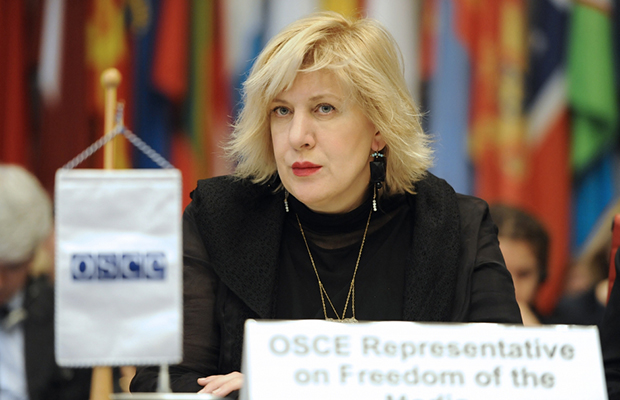
OSCE Representative on Freedom of the Media Dunja Mijatović, at the Permanent Council in Vienna, 16 January 2014. (Photo: OSCE)
Anniversaries and commemorations are times to reflect, judge and move forward. So it is with World Press Freedom Day, which we note for the 22nd time this year amid worldwide evidence of hostility toward the media.
The date of 3 May was set aside by the UN General Assembly in 1993 to foster free, independent, pluralistic media worldwide.
The Organization for Security and Co-operation in Europe, the largest regional security organisation in the world, just four years later in 1997 created the position I now hold, the Representative on Freedom of the Media. The position was established expressly to help countries that are members of the organisation (which includes all of Europe, the countries of the former Soviet Union and Mongolia, as well as the United States and Canada) implement their promises to uphold the rights to free expression and free media.
It is my job to advocate for these two concepts. It is also my job to help, cajole and sometimes plead with the 57 nations in the organisation to simply live up to their promises to provide the environment in which free expression and free media can flourish.
Over the past 18 years only three people have held the position of Representative. As I enter my sixth and last year in this position, the time has come to reflect on the state of media freedom and to analyse the overall health of free expression across the OSCE region.
To do so, I needed a base from which to judge. I found that by returning to the very first public statement issued by the Representative’s office, then headed by German politician Freimut Duve, on 7 September 1998. It announced, ironically, that Duve had been denied a visa by authorities in Belgrade to visit the Federal Republic of Yugoslavia, to lobby the government to change its policy of denying visas to reporters from other countries, some of whom were considered foreign intelligence agents.
The Helsinki Final Act of 1975, the very document that eventually brought the OSCE into existence, expressly called for improving the working conditions for journalists, which included examining “in a favorable spirit and within a suitable and reasonable time scale requests from journalists for visas” and to “grant to permanently accredited journalists…on the basis of arrangements, multiple entry and exit visas for specified periods”.
Duve wrote in the public statement: “Tito himself, as President of the former Yugoslavia, signed in 1975 his country’s acceptance of the principles and commitments of the Conference for Security and Cooperation in Europe.”
Those commitments expressly included the right of journalists to work internationally.
Promises made. Promises not kept.
Have things changed over the years?
The fact that you are reading this posting identifies you as someone well aware of the precarious position journalists and the media find themselves in today. They face a litany of problems, none of which is bigger than the issue of life itself.
The year 2015 hardly had started when eight journalists for the French magazine Charlie Hebdo were murdered in their office in Paris – over the depiction of a religious figure. Two weeks later, a discussion group in Copenhagen convened to talk about the Paris incident came under gunfire with another person killed. So much for free media. So much for free expression.
But we all know that while homicidal violence against journalists is the most drastic form of attack on free media, it is not the only one. Across the OSCE region media is subject to all nature of offences: criminal defamation laws that put reporters in jail for rooting out corruption in public places; cyber-attacks that plague internet media sites; new laws that are being adopted to criminalise free expression in the name of fighting terrorism; and increasing regulation of the internet in an effort by authoritarian governments to squelch media and free expression advocates.
The simple violations of media rights continue, too. In the past 12 months I have written to authorities and issued public statement on at least six occasions condemning the refusal of governments in the OSCE region to grant visas to foreign-based reporters. Have things really changed in 2015 from 1998? Only the countries involved; not the practices.
But even if my judgment on the past 18 years is harsh, media freedom advocates, such as me, must continue to move forward and provide the defenses necessary for free expression and free media to flourish. Complacency is not an option.
Solidarity, however, is.
For example, three rapporteurs on free expression from the United Nations, the Organization of American States and the African Commission on Human and People’s Rights and I annually issue a joint declaration on a topic related to free expression. Those declarations now are seeing their way into decisions of national and international bodies, including judgments of the European Court of Human Rights. This is real progress. Decisions upholding citizens’ rights under Article 10 of the Convention for the Protection of Human Rights and Fundamental Freedoms are real results.
And all of us must continue to raise the issue of the rights of media before national legislatures. Public awareness campaigns on behalf of media can be effective tools to prod elected officials to spend the resources, including political capital, necessary to build environments conducive to free expression. Elected officials and their appointed, often nameless and faceless bureaucrats, can be taught and encouraged to write good laws and appoint good law enforcement authorities, including police, prosecutors and judges, to interpret those laws in a fashion that will provide oxygen for those who champion free expression.
It is easy to become disillusioned and depressed by the daily fare of media issues. We should recognise the perilous state of free media and free expression in many spots in the world. But we never should lose our focus. We should take note of this date and make a personal commitment to stand for the basic human rights of free expression and free media – this year and the next and the years after that.
World Press Freedom Day 2015
• Media freedom in Europe needs action more than words
• Dunja Mijatović: The good fight must continue
• Mass surveillance: Journalists confront the moment of hesitation
• The women challenging Bosnia’s divided media
• World Press Freedom Day: Call to protect freedom of expression
This column was posted on 29 April 2015 at indexoncensorship.org
26 Sep 2014 | Digital Freedom, Europe and Central Asia, News and features, Politics and Society
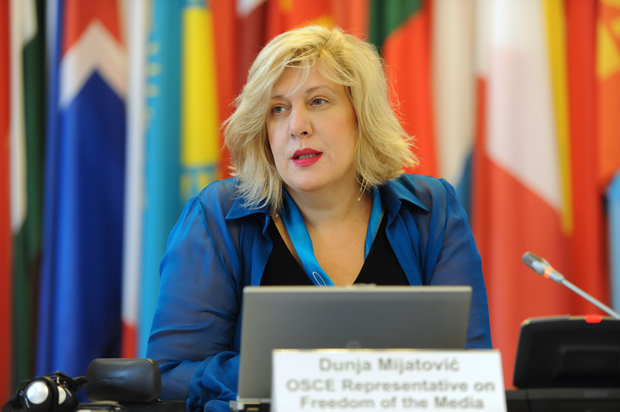
Dunja Mijatovic, OSCE Representative on Freedom of the Media
“States must stop trying to define who is and isn’t a journalist. The media landscape has changed irreversibly,” said Dunja Mijatovic, OSCE Representative on Freedom of the Media, as she opened the organisation’s Open Journalism event in Vienna on Friday, 19 Sept.
Journalism – wherever you draw its boundaries – has more voices than ever, but are all they all being properly recognised and safeguarded? This was one of the main problems addressed by the expert panel, which included Index on Censorship, alongside delegates from Azerbaijan, Serbia, Estonia, Russia, Kazakhstan, Bosnia and many other OSCE member states.
Gill Phillips, the Guardian’s director of editorial legal services, spoke via pre-recorded video about difficulties in defining journalism and deciding who gets journalistic protection. She cited the Snowden scoop, which was led by Glenn Greenwald, a former lawyer, and later embroiled his partner, David Miranda. Who gets the protection? Greenwald? Miranda? Lead staff reporter David Leigh? All three?
There was widespread condemnation of Russia’s new law, which compels bloggers with more than 3,000 views per day to be registered with the authorities. “[The bloggers] have certain privileges and obligations,” said Irina Levova, from the Russian Association of Electronic Communications, who repeatedly defended the law. “Online and offline rights are not the same,” she said, adding that some of those who deemed the law a mode of censorship have been revealed as “foreign agents”.
Another topic – raised repeatedly by various attendees – was Russian media’s growing influence over citizens in nearby countries. Begaim Usenova of the Media Policy Institute in Kyrgyzstan said: “The common view being spread from the Russian media is that the United States is starting world war three and only Putin can stop him.”
Yaman Akdeniz, a Turkish cyber-rights activist, shared news of Twitter accounts that remain blocked in his country, including some with over 500,000 followers. Igor Loskutov, a business director from Kazakhstan, looked back on the first 20 years of internet in his country and how authorities have gone from ignoring their first rudimentary websites to now wanting complete control.
The thorny issue of “public interest” was also discussed. Jose Alberto Azeredo Lopes, professor of International Law at the Catholic University of Porto, raised some smiles with his theory: “It’s like pornography. You can’t define it. But you know it when you see it.”
As the day-long discussions wrapped up, one delegate asked: if a blogger’s first-ever post goes viral, are they immediately subject to the same laws as the press? Especially in countries that now insist bloggers register.
The debate over the difference between journalists and bloggers went round in circles – as it always does – but the OSCE is hoping to be able to compile all the findings from its expert meetings into an online resource to move the discussion forward.
Azeredo Lopes concluded: “If you don’t distinguish freedom of expression from freedom of the press, you end up with no journalists, and that is the crisis that journalism faces today.”
Read our interview with Dunja Mijatovic, OSCE’s Representative on Freedom of the Media, in the autumn issue of Index on Censorship Magazine, coming soon
This article was published on Friday September 26 at indexoncensorship.org




